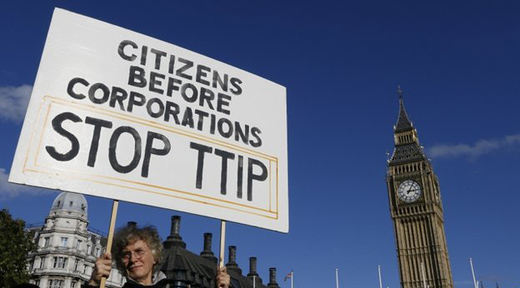
On May 28, the International Trade Committee of the European Parliament (the legislative arm of the European Union) approved, by a vote of 28 to 13, a position statement backing, with modifications, the Transatlantic Trade and Investment Partnership (TTIP) which is currently being negotiated between the United States and the European Union.
The TTIP is a companion deal for the Transpacific Partnership (TPP) which is the focus of such controversy in the United States right now. The “fast track” authorization for the TPP, passed by the U.S. Senate last week and is now headed for consideration in the House of Representatives, covers the process for approving the TTIP as well. The two trade pacts together would bring most international trade under their auspices, especially since the United States is already linked to many other countries by other, similar pacts.
As labor, environmental and other people’s organizations in the United States have raised extremely serious concerns about the TPP, many in Europe have also done so about the TTIP. High on the list of worries for European labor and the left is the Investor State Dispute Settlement mechanism.
As originally proposed for both the TPP and the TTIP, foreign corporations who felt that national or even local laws were inhibiting the maximization of their profits would be able to sue the governments concerned, and the dispute would not be decided in local or national courts by regularly appointed judges, but by special tribunals dominated by transnational corporations.
The political left, labor unions and others in Europe who are already at a high level of mobilization against austerity programs being imposed against the working class by national governments and by the “troika” of the International Monetary Fund, European Commission and European Central Bank, are strongly opposed to many aspects of the TTIP, and some are against the pact entirely.
There are other serious worries. There are complaints that U.S.-based transnationals are exerting pressure to eliminate many hard-won safeguards for the population of the European countries, and will be able to do this even more effectively under the terms of the TTIP, which, like the TPP, is being negotiated in secret.
In the United Kingdom there is a specific worry that transnational corporations will use the mechanisms of the TTIP to take over and privatize the British National Health Service.
Another issue is very intricate European Union rules on product naming: As it stands, for example, nothing can be sold in Europe as “mozzarella cheese” unless it is certified that the milk from which it is made came from genuine water buffalos and not any old cow. Multinational corporations could use the TTIP to trash these standards.
While the debate about the TPP in the United States includes worry about other countries’ in the pact pulling U.S. labor, environmental and product safety standards down, in Europe there is worry that their own labor, environmental and product safety standards will be pulled down by lower U.S. standards. For example, there is fear that efforts to exclude genetically modified crops in Europe will be knocked down by pressure from U.S. corporations.
The measure in the European parliament committee was passed on a motion by Bernd Lange of the German Social Democratic Party, with the support of the bloc of social democratic and liberal centrist parties. They achieved the insertion of language that would change the nature of the Investor State Dispute Settlement mechanism.
It would be taken away from the corporate-dominated “tribunals” and given to national tribunals appointed by the governments. However, the language of this compromise solution is exceedingly vague, and when the whole European Parliament votes on this as early as June 10, the International Trade Committee’s recommendation could be simply tossed aside.
There is also language in the measure as passed that would exclude services such as schools, health care, postal services and other things from the TTIP.
In contrast to the social democratic, centrist and right wing parties, the bloc in the European Parliament of communist and other left-wing parties strongly opposed the approval vote, and denounces the TTIP in its entirety. An essay in the British communist newspaper Morning Star put the case succinctly: “MEP’s [members of the European Parliament] should be told by individuals and representative bodies that they have no mandate for this treacherous act.”
But although the left bloc in the European parliament (the European United Left-Nordic Green Left, or GUE/NGL) picked up seats in last year’s elections, and is buoyed by advances of the left in the recent elections in Spain, it does not have the votes to defeat the TTIP right now. Its current membership includes MEPs from the Communist parties of Cyprus, the Czech Republic, France and Portugal, the Refounded Communist Party of Italy and the United Left in Spain which includes the Spanish Communist Party, as well as left-socialists such as SYRIZA in Greece, PODEMOS in Spain, die Linke in Germany and a number of others, for a total of 52 of the 751 members of the European Parliament.
To block the TTIP will require a massive, working-class led mobilization of opposition at the grassroots. The same is the case for our struggle against the TPP in the United States. And they are essentially the same struggle, with the same enemy, the international corporate behemoths.
Photo: AP

MOST POPULAR TODAY

High Court essentially bans demonstrations, freedom of assembly in Deep South

UN warns that Israel is still blocking humanitarian aid to Gaza

Resource wars rage in eastern Congo, but U.S. capitalism only sees investment opportunity


U.S. imperialism’s ‘ironclad’ support for Israel increases fascist danger at home






Comments